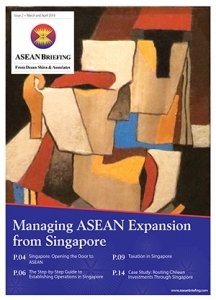China
 China Investment Roadmap: the Elderly Care Industry – New Issue of China Briefing Magazine
China Investment Roadmap: the Elderly Care Industry – New Issue of China Briefing Magazine
The latest issue of China Briefing Magazine, titled “China Investment Roadmap: the Elderly Care Industry“, is out now and available to subscribers as a complimentary download in the Asia Briefing Bookstore through the month of May.
In this issue of China Briefing magazine, we present a roadmap for investing in China’s elderly care industry. We provide the latest market research, detail the procedures and benefits for foreign direct investment, and examine the main barriers and risks that foreign companies are likely to encounter when entering the market.
Internet Censorship and China’s New Online Publication Law
China’s new Online Publishing Service Administrative Rules became effective on March 10, 2016. The law, which aims to “regulate the criteria of and promote the healthy development of internet publishing services”, has already curbed the online activity of several Western MNCs – including Apple’s iTunes and Disney’s DisneyLife – but what wider implications do the rules have for internet censorship in China?
The new online publishing rules form part of President Xi Jinping’s broader efforts to utilize China’s so called ‘Great Firewall’ to control the flow of online information. In a meeting held in April, China’s State news agency Xinhua quoted Xi as saying: “China must improve management of cyberspace and work to ensure high-quality content with positive voices creating a healthy, positive culture that is a force for good”. With 25 percent of internet sites currently blocked in China compared to the 14 percent before Xi came into power, it is evident that the country’s new approach is effective.
Opening a Bank Account in China
British payment systems firm VocaLink has formed a five year deal with China’s UnionPay, the only domestic bank card issuing company in China and one of the biggest card issuers in the world. With over 5.4 billion UnionPay bank cards currently in circulation, the deal will greatly improve Chinese bank account holders’ international connectivity, granting access to Europe and the UK’s vast ATM network.
As China’s banking system continues to liberalize and become more international, foreign investors have increasing flexibility over the management of funds. However, China’s banking system remains complex, and many restrictions apply to foreign investors. The following article lays out the steps and options foreign investors must consider when opening a Chinese bank account.
India
Foreign-owned Asset Management Companies Stymied by Conflicting Minimum Capital Requirements
In India, foreign-owned asset management companies operate under two laws with conflicting capital requirements. The first law, under the Securities and Exchange Board of India (SEBI), requires that foreign-owned asset management companies have a minimum capitalization of U.S. $7.5 million (Rs 500 million). This minimum capitalization requirement is the same for domestic asset management companies. The second law, under the Ministry of Commerce and Industry’s foreign direct investment (FDI) policy, requires foreign-owned asset management companies with more than 75 percent foreign ownership to have a minimum capitalization of U.S. $50 million, out of which U.S. $7.5 million must be brought up front, and the balance within 24 months. While the FDI rules do allow non-banking financial companies (NBFCs) with more than 75 percent FDI and a minimum capitalization of U.S. $50 million to set up down-stream subsidiaries for specific activities, without any restriction on the number of operating subsidiaries and without bringing in additional capital, the U.S. $50 million capital requirement is still a significant barrier to success.
Dissecting the India-Mauritius Amended Tax Treaty
India’s Central Board of Direct Taxes (CBDT) issued a press release on May 10, notifying of a new Protocol amending the 33-year-old India Mauritius Double Taxation Avoidance Agreement (DTAA). The Indian government is now starting talks with Singapore to introduce similar amendments in its DTAA with the nation. The two developments address the longstanding issues of tax treaty abuse and round tripping of funds. They also bear testament to India’s commitment to the Base Erosion and Profit Shifting (BEPS) Action plan proposed by the Organization for Economic Co-operation and Development (OECD).
Vietnam
Mass Fish Deaths and the Future of Environmental Regulation in Vietnam
Environmental laws are on the agenda after public criticism has put the government on the back foot for failing to protect the environment from industrial pollution. Rare protests have demanded more environmental accountability on business activities and the government has suggested there may be retroactive regulatory measures taken.
The recent attention has come about after millions of dead fish washed up along coasts in Central Vietnam last month. Locals are not daring to eat them as they are thought to be contaminated and there is a ban in force for the use of dead fish in animal feed.
An investigation has been launched to determine the cause of the fish deaths but locals have been quick to attribute the blame to polluted waters. Dead fish were first reported five kilometers from the Son Duong Port in Vung Ang Economic Zone.
Earning US $6 billion from seafood exports in 2015, Vietnam is heavily reliant on its fishing industry. In the months ahead, companies will need to be more diligent in their environmental considerations as authorities are expected to be more stringent in their assessment of environmental impacts in the wake of recent events.
Vietnamese Labor Under TPP: A Guide to Commitments and Compliance
Vietnam is on its way to being the largest beneficiary of the Trans-Pacific Partnership (TPP). The agreement will produce greater access to foreign markets and foreign direct investment for Vietnam through the reduction of 18,000 tariff lines on industrial and agricultural products. However, in order to gain access to these reductions, Vietnam is expected to comply with labor standards outlined in the agreement as well as specific commitments made under the US-VN Plan for Enhancement of Trade and Labor Relations.
The Philippines
Rodrigo Duterte’s Economic Vision: The Punisher’s Plans for the Philippines
As Philippine president-elect Rodrigo Duterte prepares to take office on June 30, investors and business people both at home and abroad are wary of how the audacious politician will impact the country’s booming economy. Under President Aquino, the Philippines enacted several liberal macroeconomic reforms and experienced an average GDP growth rate of 6.2 percent, leading the Oxford Business Group to name the country the best economy in South East Asia. However, widespread anger over elitism, corruption, inequality, and crime catapulted the controversial politician to the country’s highest office despite little explanation of his economic policies.
Indonesia
Understanding Tax Treatment of Representative Offices in Indonesia
In early April 2016, Indonesia Tax Authority indicated that Google Indonesia, Yahoo Indonesia, Facebook Singapore Pte Ltd and Twitter Asia Pacific Pte Ltd were avoiding tax in Indonesia.
Among the four companies, Facebook and Twitter are established in Indonesia in form of Representative Offices (RO). This article will not analyze the pros and cons of the representative office compared to other investment vehicles, but instead will focus on application of tax regulation to representative offices; and highlight regulations that caused tax authorities to target Facebook and Twitter.
Russia
State-funded infrastructural projects won’t pull Russia out of recession
Investment in infrastructure is a poor antidote to Russia’s economic ailments, Andrey Movchan, well-known Russian financial manager and director of the Economic Policy Program at the Carnegie Moscow Center, writes in his critical review concerning Russian economic slowdown.
Unlike the former First Deputy Minister of Economic Trade and Development Mikhail Dmitriev, who has actively promoted the idea of investing at least 3 percent of Russia’s GDP in infrastructural projects annually, Movchan doubts that doing so will result in long-term GDP growth of 3 percent per year.
|
About Us Asia Briefing Ltd. is a subsidiary of Dezan Shira & Associates. Dezan Shira is a specialist foreign direct investment practice, providing corporate establishment, business advisory, tax advisory and compliance, accounting, payroll, due diligence and financial review services to multinationals investing in China, Hong Kong, India, Vietnam, Singapore and the rest of ASEAN. For further information, please email asia@dezshira.com or visit www.dezshira.com. Stay up to date with the latest business and investment trends in Asia by subscribing to our complimentary update service featuring news, commentary and regulatory insight. |
![]()
 The Asia Sourcing Guide 2015 In this issue of Asia Briefing, we explain how and why the Asian sourcing market is changing, compare wage overheads, and look at where certain types of products are being manufactured and exported. We discuss the impact of ASEAN’s FTAs with China and India, and highlight the options available for establishing a sourcing model in three locations: Vietnam, China, and India. Finally, we examine quality control in each of these markets.
The Asia Sourcing Guide 2015 In this issue of Asia Briefing, we explain how and why the Asian sourcing market is changing, compare wage overheads, and look at where certain types of products are being manufactured and exported. We discuss the impact of ASEAN’s FTAs with China and India, and highlight the options available for establishing a sourcing model in three locations: Vietnam, China, and India. Finally, we examine quality control in each of these markets.  Managing ASEAN Expansion from Singapore For the second issue of our ASEAN Briefing Magazine, we look at the benefits of using Singapore a hub for the management of regional operations throughout ASEAN. We firstly focus on the position of Singapore relative to its competitors, such as the Netherlands and Hong Kong. We then provide step-by-step instructions on corporate establishment, and provide expert insight on maximizing returns through the reduction respective tax burdens. The 2015 Asia Tax Comparator
Managing ASEAN Expansion from Singapore For the second issue of our ASEAN Briefing Magazine, we look at the benefits of using Singapore a hub for the management of regional operations throughout ASEAN. We firstly focus on the position of Singapore relative to its competitors, such as the Netherlands and Hong Kong. We then provide step-by-step instructions on corporate establishment, and provide expert insight on maximizing returns through the reduction respective tax burdens. The 2015 Asia Tax Comparator In this issue, we compare and contrast the most relevant tax laws applicable for businesses with a presence in Asia. We analyze the different tax rates of 13 jurisdictions in the region, including India, China, Hong Kong, and the 10 member states of ASEAN. We also take a look at some of the most important compliance issues that businesses should be aware of, and conclude by discussing some of the most important tax and finance concerns companies will face when entering Asia.
In this issue, we compare and contrast the most relevant tax laws applicable for businesses with a presence in Asia. We analyze the different tax rates of 13 jurisdictions in the region, including India, China, Hong Kong, and the 10 member states of ASEAN. We also take a look at some of the most important compliance issues that businesses should be aware of, and conclude by discussing some of the most important tax and finance concerns companies will face when entering Asia.


